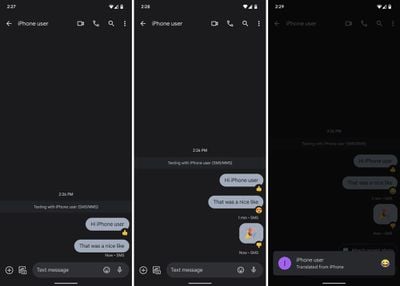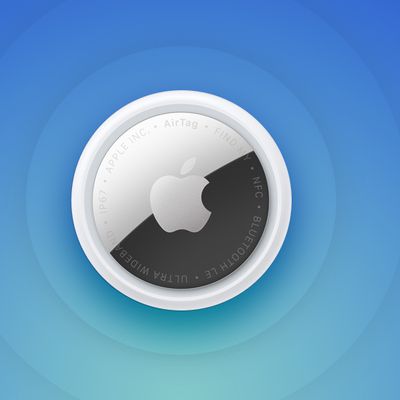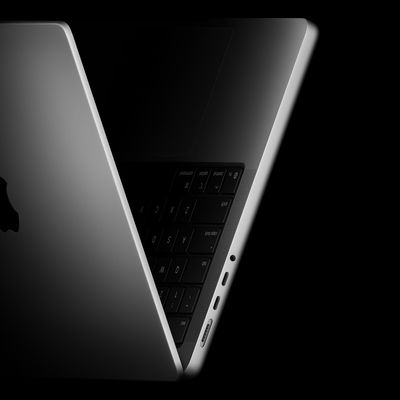iMessage Reactions Will No Longer Annoy Android Users Thanks to Emoji Change
Last Friday, code suggested Google would soon roll out an update for Google Messages that would display iMessage Reactions from iPhone users as emoji on Android devices, and now that update has started rolling out.

Screenshots from 9to5Google reader
Jvolkman
According to 9to5Google, some Android users are beginning to see iMessage reactions in Google Messages as emoji that are linked to the relevant conversation.
Google Messages appears to be interpreting iMessage reactions just like reactions sent through the RCS protocol used for Google Messages rather than providing them in a text format.
Prior to the Google Messages update, if an iPhone user added a reaction like a heart or thumbs up to a message in the Messages app, it would look odd on an Android device while showing up appropriately on an iPhone. Adding a heart icon to a message showed a little heart on iPhone, for example, but on Android, it would show up as [Person] "Loved" and then the text of the original message.
The text-based system could lead to awkwardness, especially with Android users unaware of iMessage reactions. It also cluttered up the chat thread by unnecessarily repeating texts.
As shown in the screenshots above, the reaction messages are linked to the chat bubble, and they also use icons pulled from the RCS system. As 9to5Google points out, the little heart for "loving" an image on iPhone is replaced with a heart eyes emoji on Android, and the laugh iMessage Reaction is translated into a laughing face emoji.
Android devices will also display a "translated from iPhone" icon so that Google Messages users understand where the reaction is coming from.
Popular Stories
Apple today introduced its first two physical products of 2026: a second-generation AirTag and the Black Unity Connection Braided Solo Loop for the Apple Watch.
Read our coverage of each announcement to learn more:Apple Unveils New AirTag With Longer Range, Louder Speaker, and More
Apple Introduces New Black Unity Apple Watch BandBoth the new AirTag and the Black Unity Connection Braided...
Apple today introduced the second-generation AirTag, with key features including longer range for tracking items and a louder speaker.
For those who are not familiar, the AirTag is a small accessory that you can attach to your backpack, keys, or other items. Then, you can track the location of those items in the Find My app on the iPhone, iPad, Mac, Apple Watch, and iCloud.com.
The new...
Alongside iOS 26.2.1, Apple today released an updated version of iOS 12 for devices that are still running that operating system update, eight years after the software was first released.
iOS 12.5.8 is available for the iPhone 5s and the iPhone 6, meaning Apple is continuing to support these devices for 13 and 12 years after launch, respectively. The iPhone 5s came out in September 2013,...
Apple plans to release new MacBook Pro, MacBook Air, Mac Studio, and Studio Display models in the first half of this year, according to Bloomberg's Mark Gurman.
In his Power On newsletter today, Gurman added that redesigned MacBook Pro models with an OLED touch screen "should be hitting toward the end of 2026," meaning that the MacBook Pro line would be upgraded twice this year.
First up...
2026 promises to be yet another busy year for Apple, with the company rumored to be planning more than 20 product announcements over the coming months.
Beyond the usual updates to iPhones, iPads, Macs, and Apple Watches, Apple is expected to release its all-new smart home hub, which was reportedly delayed until the more personalized version of Siri is ready. Other unique products rumored for ...





















